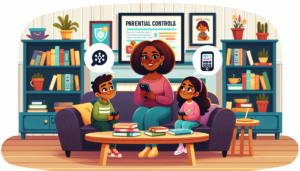Bullying has always existed, but cyberbullying is a relatively new issue. Now that nearly every teen has 24/7 access to a smartphone, bullying can happen at any time and in any place. It can happen on social media, on websites, on gaming platforms, and through texting. Because it happens on the internet, cyberbullying can be even more intense than face-to-face bullying. The bully’s actions can be seen by hundreds of peers within seconds, and the victim may feel like there’s no way to escape.
All of this means that it can be incredibly difficult for teens to get help when they’ve been cyberbullied and for parents to see the signs that their child is being cyberbullied. They may feel ashamed and be reluctant to reach out to an adult. In fact, many kids who are cyberbullied don’t tell anyone. However, statistics show just how prevalent this problem is: 1 in 10 boys and 1 in 5 girls are cyberbullied.
Key Takeaways:
- Prevalence and Impact: Cyberbullying affects a significant number of teens, with 1 in 10 boys and 1 in 5 girls experiencing it. Its omnipresence can lead to feelings of inescapability and shame, often preventing teens from seeking help.
- Physical and Emotional Signs: Noticeable changes in sleep patterns, eating habits, and physical symptoms like headaches or stomachaches can be indicators of cyberbullying. Depression, anxiety, and low self-esteem are common emotional responses.
- Behavioral Changes: A decline in interest in activities, unusual behavior around technology, and academic challenges are telltale signs. Cyberbullied teens may avoid social interactions or display anxiety over phone notifications.
- Response Strategies: Addressing cyberbullying involves open, non-judgmental conversations with teens. Avoid overreactions or immediate punishments; instead, focus on understanding and supporting them.
- Building a Support Network: Encourage teens to identify trusted adults beyond parents, such as teachers or family members, to discuss cyberbullying issues. This network provides additional avenues for support and intervention.
Changes in Sleeping Patterns
Children may have difficulty falling asleep or staying asleep. They may even fall asleep at school. On the other hand, some children who are bullied oversleep and have trouble getting out of bed. They may also regress to bedwetting if they are being cyberbullied.
Depression
Your child may suffer depression or anxiety if being bullied. Depression can take many forms, including deep sadness, anger, extreme fatigue or restlessness, or being withdrawn from friends and normal activities.
Physical Symptoms
Cyberbullying can evoke a range of uncomfortable emotions: stress, nervousness, embarrassment, and others. All of these emotions are tied to your child’s physical health, too. A bullied child may experience headaches, stomachaches, or other unexplained physical symptoms.
Changes in Eating Habits
Some kids who are bullied eat more than usual; some will eat less. Especially in teen girls, bullying is associated with anorexia and bulimia.
Loss of Interest in Activities
If your child used to love participating in a certain club or social activity but now doesn’t want to leave the house, something may be wrong. The child may be avoiding the bully feel embarrassed by something the bully did.
Acting Unusual Around Technology
How does your child usually act with a phone or computer? If you notice an abrupt change in behavior, this may be a sign of online bullying. This could include spending much less time engaging with technology or acting anxious when a smartphone notification appears.
Low Self-Esteem
Children who are the victims of online bullying have lower self-esteem than those who are not bullied. You may witness this in the way your child talks or in the way she behaves.
School Issues
Studies show that students who are bullied show lower academic achievement and get lower grades than those who are not bullied. These victims may participate less in class discussions and shy away from anything that would make them stand out at school.
Your child may even refuse to go to school. A study by the Federal Commission on School Safety found that “over 60% of the students who experienced cyberbullying stated that it deeply affected their ability to learn and feel safe at school [and]… 10% of students surveyed said they skipped school at least once in the previous year because of cyberbullying.”
What Do I Do Now?
If you notice these signs in your children, sit down to have an honest conversation with them. Be careful, though, because some of your most natural reactions may turn your teen away and make the situation worse. Try to avoid overreacting, getting angry, or jumping right into a punishment.
Instead, listen to your teen and provide resources to help her escape the cyberbullying.
Because teens are often reluctant to tell their parents about cyberbullying, it’s essential that they have a handful of other adults they trust, too. Talk with your teens about cyberbullying, and help them brainstorm a list of trusted adults. This could include, for example, teachers, counselors, aunts or uncles, or adult siblings.
In conclusion, awareness and proactive communication are key to helping teens navigate and overcome the challenges of cyberbullying. For more insights and resources, visit our blog.
Additional Resources
Barrington, K. 2020, November 5. How Does Bullying Affect a Student’s Academic Performance? Public School Review. https://www.publicschoolreview.com/blog/how-does-bullying-affect-a-students-academic-performance.
Burnham, J.J., Wright, V.H. (2012). Cyberbullying: What Middle School Students Want You to Know. Alabama Counseling Association Journal. 38(1), 3–12. https://files.eric.ed.gov/fulltext/EJ990743.pdf.
Gordon, S. 2020, February 8. How Bullying Can Cause Eating Disorders. VeryWell Family. https://www.verywellfamily.com/bullying-linked-to-eating-disorders-460616.
Healio. 2015, June 22. Cyberbullying Linked to Depression in Adolescents.https://www.healio.com/news/psychiatry/20150622/cyberbullying-linked-to-depression-in-adolescents.
Hiduja, S. 2020, December 1. Federal Commission on School Safety.Cyberbullying.org. https://cyberbullying.org/federal-commission-on-school-safety.
Mayo Clinic. 2018, November 16. Teen Depression.https://www.mayoclinic.org/diseases-conditions/teen-depression/symptoms-causes/syc-20350985.
Megan Meier Foundation. 2018, October 10. Cyberbullying Resources.https://www.meganmeierfoundation.org/cyberbullying.
The Nemours Foundation. 2009, January 2. Cyberbullying. KidsHealth. https://kidshealth.org/en/parents/cyberbullying.html.
Stephens, M.M., Cook-Fasano, H.T., Sibbaluca, K. (2018). Childhood Bullying: Implications for Physicians. American Family Physician. 97(3), 187–192. https://www.aafp.org/afp/2018/0201/p187.html.
Stop Bullying https://www.stopbullying.gov/cyberbullying/prevention





